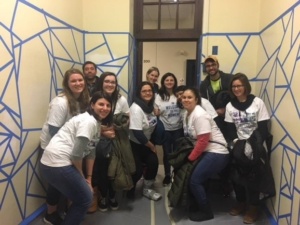CLIENT ALERT: USCIS Changes H-1B Cap Process
On January 31, USCIS published the final rule revising the H-1B cap procedures. The overall goal of this change was to streamline the process for companies, as well as to consider the Buy American, Hire American Executive Order by revising the process so it is more beneficial to advanced degree holders. Here is a breakdown of the changes:
- Reversal of the H-1B Lottery: The new process will consist of the lottery for all H-1B petitions to select the 65,000 petitions for the regular cap (Bachelor’s degree holders and above). Once that lottery is complete, the remaining beneficiaries who have advanced degrees from U.S. universities will get placed in the second lottery to select the additional allotment of 20,000 Master’s degree cases. This will take effect on April 1, 2019 so it will impact this year’s H-1B cap season. The intended result is to award more U.S. Master’s degrees holders H-1B status. Estimates indicate that this will increase the number of H-1Bs issued to U.S. Master’s degree holders, and decrease the number issued to other qualified workers, by about 16%, or more than 5,000 cases.
- Electronic Pre-registration: With an estimated start of April 2020, USCIS will have an online registration form for employers to submit their entrances in the H-1B lottery. Employers will have 14 days to submit the registration forms for each potential H-1B beneficiary. USCIS will then conduct the lottery based on the registration, and employers will then submit the full and complete H-1B petitions for the selected entrants during the filing period, which is supposed to last at least 90 days.
We are monitoring these changes very closely. Please contact your Klasko attorney to discuss how these changes may impact your business.
Tens of Thousands of Immigration Court Hearings Canceled Due to Shutdown; Trump Announces Three-Week Reopening of Federal Government
According to a report by Syracuse University’s Transactional Records Access Clearinghouse (TRAC), an estimate of more than 80,000 immigration court hearings were canceled due to the partial federal government shutdown, which began at midnight on December 22, 2018, and ended on January 25. President Donald Trump has announced a reopening of the government for three weeks, until February 15.
The report notes that the active case backlog was already at 809,041 as of the end of November 2018. Judge Dana Leigh Marks termed the shutdown’s effect “devastating” and estimated that it could add three or four years to the wait before those canceled hearings can be rescheduled. According to TRACImmigration’s figures as of January 11, Immigration Courts in California experienced the most hearing cancellations: an estimated 9,424. New York had the second highest number of cancellations, at 5,320. Texas was close behind New York with an estimated 5,141 immigration court proceedings canceled.
The fee-based U.S. Citizenship and Immigration Services remained open during the shutdown. Systematic Alien Verification for Entitlements (SAVE) program services remained operational during the shutdown and SAVE said users should continue to submit cases to verify an applicant’s immigration or citizenship status. The Department of State said that scheduled passport and visa services in the United States and at U.S. embassies and consulates overseas continued during the shutdown “as the situation permit[ted].” E-Verify announced, “E-Verify has resumed operations. Given that E-Verify was unavailable for over a month, we ask for your patience as we reinstate the service.”
The TRACImmigration report is here. Information about the growing backlog is here.
USCIS Resumes Premium Processing for FY 2019 H-1B Cap Petitions
U.S. Citizenship and Immigration Services (USCIS) announced that it has resumed premium processing as of Monday, January 28, 2019, for all fiscal year (FY) 2019 H-1B cap petitions, including those eligible for the advanced degree exemption (master’s cap). Petitioners who have received requests for evidence (RFEs) for pending FY 2019 cap petitions should include their RFE response with any request for premium processing they may submit.
When a petitioner requests the agency’s premium processing service, USCIS guarantees a 15-day processing time. If USCIS does not take certain adjudicative action within the 15-calendar-day processing time, the agency refunds the petitioner’s premium processing service fee and continues with expedited processing of the petition. USCIS said this service is only available for pending petitions, not new submissions, “because we have already received enough petitions to meet the FY 2019 cap.”
The previously announced temporary suspension of premium processing remains in effect for all other categories of H-1B petitions to which it applied. USCIS said it plans “to resume premium processing for the remaining categories of H 1B petitions as agency workloads permit.”
The USCIS announcement is here. The previous notice about the suspension of premium processing and who is affected is here.
USCIS Announces Countries Eligible for H-2A and H-2B Visa Programs
U.S. Citizenship and Immigration Services (USCIS) and the Department of Homeland Security, in consultation with the Department of State, have announced the list of countries whose nationals are eligible to participate in the H-2A and H-2B visa programs in 2019.
For 2019, the agencies have agreed to:
- Add Mozambique and Samoa to the list of countries eligible to participate in the H-2A and H-2B visa programs;
- Add Paraguay to the list of countries eligible to participate in the H-2A visa program;
- No longer designate Ethiopia and the Philippines as eligible countries because they no longer meet the regulatory standards for the H-2A and H-2B visa programs; and
- No longer designate the Dominican Republic as an eligible country for the H-2B visa program because it no longer meets the regulatory standards for that program.
USCIS said factors that could result in the exclusion of a country or the removal of a country from the list include but are not limited to fraud, abuse, denial rates, overstay rates, human trafficking concerns, and other forms of noncompliance with the terms and conditions of the H-2 visa programs by nationals of that country.
The USCIS announcement is here. The related Federal Register notice is here.
State Dept. Suspends Visa Services in Caracas, Venezuela
The U.S. Embassy in Caracas has suspended routine visa services due to the ordered departure of non-emergency personnel.
Due to the unrest in Venezuela, on January 24, 2019, the U.S. Department of State ordered non-emergency U.S. government employees to leave Venezuela. The U.S. embassy said the U.S. government has limited ability to provide emergency services to U.S. citizens in Venezuela. U.S. citizens are directed to contact U.S. Embassy Caracas for consular assistance. U.S. citizens residing or traveling in Venezuela “should strongly consider departing Venezuela,” the embassy said. Commercial flights remained available. U.S. citizens in Venezuela are advised that if they stay in Venezuela, they ensure that they have adequate supplies to shelter in place, review personal security plans, and monitor local media for updates.
The Department’s announcement is here. The U.S. embassy’s security alert is here.
Trump Administration Implements Remain-in-Mexico Asylum Procedure
According to reports, the Trump administration is implementing a procedure to force certain asylum-seekers wishing to come to the United States to remain in Mexico while their cases are processed. The plan, to begin at the San Ysidro border crossing, reportedly includes busing asylum-seekers to their hearings at a courthouse in San Diego, California, from Tijuana, Mexico.
This activity follows a December 2018 announcement by Homeland Security Secretary Kirstjen Nielsen of new “Migration Protection Protocols (MPP),” which will apply to individuals arriving in or entering the United States via Mexico without documentation. ” ‘Catch and release’ will be replaced with ‘catch and return,’ ” the announcement states.
The Department of Homeland Security (DHS) released information on the MPP on January 24, 2019. Among other things, the information notes that:
With certain exceptions, MPP applies to aliens arriving in the U.S. on land from Mexico (including those apprehended along the border) who are not clearly admissible and who are placed in removal proceedings under INA § 240. This includes aliens who claim a fear of return to Mexico at any point during apprehension, processing, or such proceedings, but who have been assessed not to be more likely than not to face persecution or torture in Mexico. Unaccompanied alien children and aliens in expedited removal proceedings will not be subject to MPP. Other individuals from vulnerable populations may be excluded on a case-by-case basis.
The December announcement outlines the following process:
- “Aliens trying to enter the U.S. to claim asylum will no longer be released into our country, where they often disappear before a court can determine their claim’s merits.
- Instead, those aliens will be processed by DHS and given a ‘Notice to Appear’ for their immigration court hearing.
- While they wait in Mexico, the Mexican government has made its own determination to provide such individuals humanitarian visas, work authorization, and other protections. Aliens will have access to immigration attorneys and to the U.S. for their court hearings.
- Aliens whose claims are upheld by U.S. judges will be allowed in. Those without valid claims will be deported to their home countries.”
It is unclear how many are expected to follow this process or whether Tijuana has sufficient capacity to keep asylum seekers safe while they await their proceedings in the United States. Litigation is considered likely. The American Immigration Lawyers Association called the new policy a “due process disaster for asylum seekers” and said that asylum seekers waiting in Mexico “would encounter substantial barriers to accessing U.S. attorneys.”
Secretary Nielsen’s December announcement is here. A related DHS announcement is here. DHS released U.S. Customs and Border Protection data about apprehensions along the southwest border with the United States and related demographics, which is here.
Klasko News
FIRM NEWS
Save the Date! Klasko Immigration Law Partners is pleased to host its 15th annual Spring Seminar at the Union League of Philadelphia on April 16, 2019. Stay tuned for registration information.
IN THE NEWS
William A. Stock Quoted in Philly.com Article
Bill spoke with Philly.com about the conditions on which foreign nationals seek and receive asylum and the history of asylum in the U.S.
William A. Stock also Spoke with Philly.com on Government Shutdown
Bill also spoke with Philly.com about how the government shutdown affects backlogged deportation cases.
William A. Stock Quoted in Bloomberg Businessweek article
Bill explains ICE’s role in the disruption of a town’s employers and employees.
RANKINGS
Three Klasko Partners Land in the 2018 Top 25 Attorneys list by EB5 Investors Magazine.
Ron Klasko, Daniel Lundy, and Anu Nair were all ranked in the Top 25 EB-5 attorney list by EB5 Investors Magazine. To view the rankings online, click here and here.
UPCOMING SPEAKING ENGAGEMENTS
Lisa T. Felix
Lisa discussed how to launch a startup for Penn international Students at the University of Pennsylvania on January 28th.
Feige M. Grundman
On February 22nd, Feige will be speaking to international students at Bryn Mawr College about work, internship, and volunteer options off-campus, as well as the impact of the new unlawful presence policy.
Anu Nair
On February 10th, Anu Nair will be a panelist at an industry conference in Dubai hosted by EB5 Investors Magazine. Her panel is entitled, Maneuvering EB5 Process: Knowing your options as an Investor.
Ronald Klasko
Ron Klasko will be speaking at the AILA New York chapter about developments in litigation on February 13th.
William A. Stock l Elise Fialkowski
Bill and Elise will be featured speakers at Philadelphia HR Summit’s Key HR Trends and Best Practices Conference on February 21. Their panel will be entitled Global Talent Challenges in a Border Wall World.
William A. Stock
Bill will be hosting an Immigration 101 Workshop at a global, full-service law firm in Philadelphia on February 26th.
ICYMI: RECENT BLOG POSTS AND ALERTS
A New Episode of Statutes of Liberty was Published
Check out the new episode of Statutes of Liberty: An Immigration Podcast, in which Anu Nair and Karuna Simbeck cover the “Do’s and Don’ts of Source of Funds” for EB-5 investors.
Green Card Purgatory for Highly Skilled Immigrants
Lisa Felix provides extensive information on the path to a green card and the challenges associated with filing and getting approval in this article published by the Legal Intelligencer.
The Impact of the EB-5 Backlog for India
Anu wrote an article for the 12th issue of EB5 Investors Magazine on the impending EB-5 backlog for Indian nationals. Read the article here.
FIRM FEATURE
Celebrating Martin Luther King, Jr. with a Day of Service



On Monday January 21, a group of Klasko employees joined City Year to assist in brightening up the walls of Kensington High School with colorful and inspirational murals.
Stay Connected! Subscribe to our blog and follow us on Twitter, Facebook and LinkedIn.
This newsletter was prepared with the assistance of ABIL, the Alliance of Business Immigration Lawyers, of which Klasko Immigration Law Partners is an active member.
